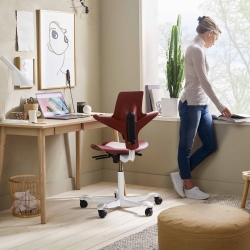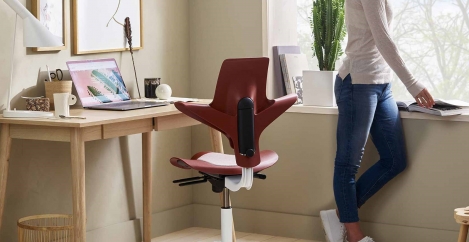October 11, 2021
Office furniture makers are getting creative about the environment
 I was reminded the other day of the instructions on a bottle of shampoo I once used which said, simply: “Wash, rinse and repeat.” Why? I’ve just washed my hair. Why do I need to repeat? It’s a bit like that old adage about how to sell more toothpaste, by widening the hole it comes out of, because we all still instinctively try to cover the whole of the brush head, however thick the line of paste.
I was reminded the other day of the instructions on a bottle of shampoo I once used which said, simply: “Wash, rinse and repeat.” Why? I’ve just washed my hair. Why do I need to repeat? It’s a bit like that old adage about how to sell more toothpaste, by widening the hole it comes out of, because we all still instinctively try to cover the whole of the brush head, however thick the line of paste.
Success in any industry is still largely measured by the amount we produce and sell, but we’re starting to see a growing and welcome change in emphasis amongst workplace clients towards the quality of what is delivered and there are a number of ways that we’re helping them to achieve their own climate goals, not through “repeat”, but reuse, restore, repurpose, reduce and recycle.
Many of the office furniture manufacturers we work with are leading the way.
Herman Miller has recently launched its Aeron Onyx chair, which is made from ocean bound plastics. The raw materials are scavenged from beaches, cleaned, sorted and then pelletised before being tested and converted into the chair parts. This new type of plastic will be integrated into all their products with a pledge that by 2030, there will by 50 percent recycled content in all their materials. The changes will mean that annually, over 234 tonnes of plastic will be diverted away from the world’s oceans, the equivalent of 23 million plastic bottles.
Flokk’s HÅG Capisco Puls (pictured) is engineered from old snow plough markers. The poles were used to mark the edges of roads during Norway’s winters and were discarded at the end of the season. Flokk saw an opportunity to repurpose this plastic to create this unique, limited edition chair.
Vitra has been expanding its range of RE products that are made from recycled household waste, particularly packaging. The Tip Ton chair, Toolbox accessory and Chap stool are all manufactured from this material which generates 54 percent less climate damaging emissions than standard plastic. All Vitra Originals including the Tip Ton also come with a warranty of up to 30 years, which means someone starting in the workforce today could spend their entire working lifetime with the same chair.
Then there is Naughtone who have just released the Ever sofa which was designed with end-of-life in mind. All the components can be easily separated and once the 10-year warranty has passed, the settee or chair can be sent back to Naughtone who will make sure the raw materials are responsibly processed and given a new purpose.
But it’s not just about new office furniture products. When it comes to moving offices, which we are seeing more of as companies adapt to new hybrid forms of working, our qualified service engineers have also been able to re-upholster existing furniture for some projects which clients can take with them into the next installation. Our rental service has proved particularly popular as the pandemic saw a huge and sudden move towards working from home.
Repurposing older chairs for re-use and disposing of old products responsibly are also an important area of focus. For example, we are currently repurposing a high-profile client’s very large, solid oak boardroom table into a sit-stand desk and meeting table for their Financial Director. While recycling is an important part of our business, whether it’s furniture, cardboard packaging, or food waste, this is a conversation that needs to go beyond the standard.
We shall all be watching events in Glasgow closely and there’s little doubt that we need to think radically differently about all aspects of our lives in order to tackle the climate challenge. For the office furniture industry, the idea that we need to produce less, but sell more, may feel almost contradictory, but it is one that the we should all commit to exploring further.

Leanne Stretton is the Commercial Director of Wellworking
















